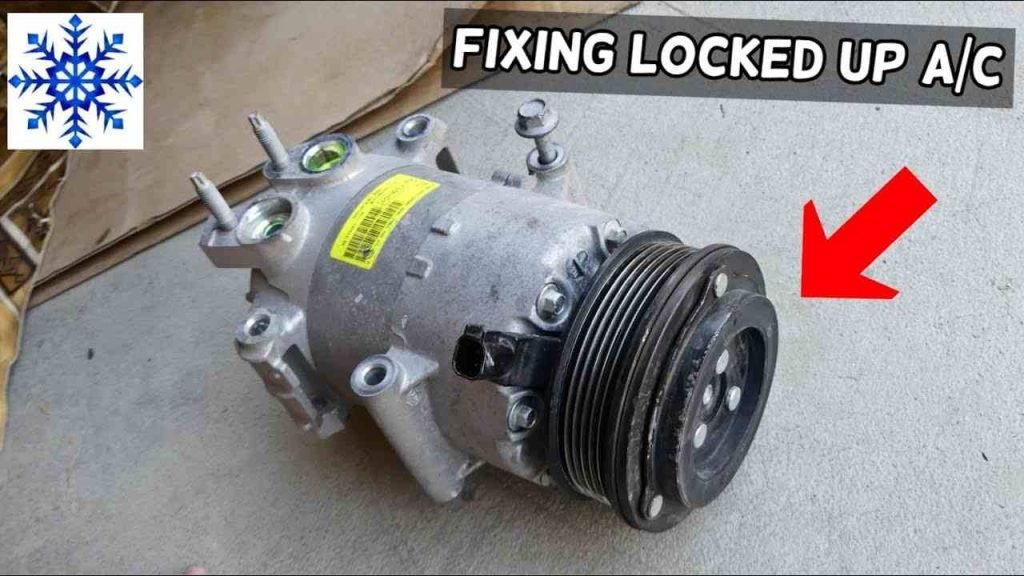Ensuring that your truck’s AC compressor is working properly is crucial for maintaining a comfortable driving experience, especially in hot weather. The AC compressor is responsible for circulating refrigerant through the system to cool the air before it reaches the cabin. In this guide and with the help of Go-go Logistics & Transport , we’ll walk you through some straightforward steps to check the performance of your AC compressor and identify potential problems. Regular checks and prompt repairs will keep your truck’s air conditioning system running smoothly and efficiently.

If you’re noticing issues like weak air flow, warm air blowing from the vents, or unusual noises when the AC is on, it could be a sign that your compressor isn’t functioning correctly. You might also observe fluctuating temperatures or a noticeable decrease in cooling efficiency. Regular maintenance and checks can help prevent these issues from escalating and ensure your truck’s AC system operates at peak performance. If these symptoms arise, it’s crucial to seek professional A/C repair services to accurately diagnose and address the problem, restoring your truck’s cooling system to optimal condition.
Signs of a Failing AC Compressor
A failing AC compressor often shows clear symptoms. Common signs include reduced or no cold air blowing from the vents, which indicates that the compressor might not be circulating refrigerant properly. You might also notice strange noises, such as grinding or squealing, which can signal internal damage. Additionally, if your AC system cycles on and off frequently, it could mean the compressor is struggling to maintain pressure. To address these issues effectively, perform a comprehensive truck A/C system inspection to check for other potential problems. Observing these signs early and addressing them promptly can prevent further damage and avoid costly repairs. Regular maintenance and timely inspections can help catch these issues before they become severe, ensuring your truck’s AC system remains in good working order.
How to Check for Weak Air Flow
Weak air flow from your truck’s AC system can be a sign of several underlying issues. To check for weak air flow, start by ensuring that the air filters are clean and not clogged, as dirty filters can restrict airflow. Next, check the blower motor and its components for proper operation. Low refrigerant levels can also lead to weak airflow, so verify if the refrigerant needs a recharge. Inspect the ductwork for any obstructions or leaks that might be impeding air flow. Additionally, proper truck A/C servicing can prevent overheating issues by ensuring that the system is functioning efficiently. By addressing these factors, you can improve the efficiency of your AC system and ensure a more comfortable driving experience.
Diagnosing Warm Air from AC Vents
If your truck’s AC vents are blowing warm air, the issue might be with the AC compressor or the refrigerant levels. Start by checking if the AC compressor engages when the system is turned on; a malfunctioning compressor can result in warm air. Low refrigerant levels can also cause warm air to blow, so checking the refrigerant levels and refilling if necessary can resolve this issue. Additionally, inspect the AC system for leaks or blockages that could be affecting its performance. Recognizing and addressing unusual truck A/C odors is also crucial, as strange smells can indicate issues like mold growth or refrigerant leaks. Addressing these issues promptly can restore proper cooling and maintain the comfort of your truck’s cabin.
Identifying Unusual Noises from the AC Compressor
Unusual noises from the AC compressor can indicate potential problems. Grinding or rattling sounds may suggest internal damage or worn-out bearings. Squealing noises often point to a loose or worn-out serpentine belt that drives the compressor. Hissing or bubbling noises could be due to refrigerant leaks or pressure issues. Identifying these noises early helps in diagnosing the problem accurately. Regular maintenance and prompt repairs can prevent further damage to the compressor and ensure the AC system operates smoothly. Consulting with a professional can provide a thorough inspection and necessary repairs to keep your truck’s AC in optimal condition.
Testing the AC Compressor Clutch
The AC compressor clutch is essential for engaging and disengaging the compressor. To test the clutch, start by turning on the AC and observing the clutch’s engagement. If the clutch does not engage or disengages erratically, it might be faulty. You can also use a multimeter to check the electrical connections and ensure there is proper voltage. Inspect the clutch for signs of wear or damage, and ensure it is operating smoothly. If the clutch is not functioning correctly, it can affect the overall performance of the AC system. Addressing these issues promptly can help maintain the efficiency and reliability of your truck’s air conditioning system.

Checking the AC Compressor’s Refrigerant Levels
Refrigerant levels are crucial for the proper operation of the AC compressor. To check the refrigerant levels, use a pressure gauge to measure the pressure in the AC system. Compare these readings with the manufacturer’s specifications to determine if the refrigerant is at the correct level. Low refrigerant levels can lead to inadequate cooling and affect the compressor’s performance. If levels are low, it might be necessary to add more refrigerant or check for leaks in the system. Regularly monitoring refrigerant levels and ensuring they are within the recommended range helps maintain optimal cooling efficiency and prolongs the life of your truck’s AC system.
Inspecting for Leaks in the AC System
Leaking refrigerant can significantly impact the performance of your truck’s AC system. To inspect for leaks, visually check the AC components, such as the compressor, hoses, and connections, for signs of oil or refrigerant residue. Using a UV dye and a blacklight can help identify leaks that are not visible to the naked eye. Additionally, pressure testing the system can reveal leaks by observing any drop in pressure. Addressing leaks promptly ensures that the AC system operates efficiently and prevents further damage to the compressor or other components. Regular inspections and maintenance can help keep your truck’s AC system in good working order.
Examining the AC Compressor Belt and Connections
The AC compressor belt and its connections play a vital role in the operation of the air conditioning system. Check the belt for signs of wear, such as cracks or fraying, and ensure it is properly tensioned. A loose or damaged belt can cause the compressor to function intermittently or fail to engage. Inspect the connections to ensure they are secure and free from corrosion. Properly maintaining the belt and connections helps ensure that the AC compressor operates efficiently and reliably. Regularly examining these components as part of your truck’s maintenance routine can prevent issues and extend the lifespan of the AC system.
Evaluating Electrical Issues Affecting the AC Compressor
Electrical issues can significantly impact the performance of the AC compressor. Start by checking the fuse related to the AC system, as a blown fuse can disrupt the compressor’s operation. Inspect the wiring and connectors for signs of damage or corrosion that might be affecting the electrical flow. Use a multimeter to test the voltage and ensure that the compressor is receiving adequate power. Electrical problems can also include faulty relays or switches, which can prevent the compressor from engaging properly. Addressing these electrical issues promptly helps maintain the AC system’s efficiency and prevents potential breakdowns.
Understanding the Impact of AC System Pressure on Compressor Function
The pressure within the AC system is critical for the compressor’s proper function. Both high and low pressure can affect the compressor’s performance. High pressure can occur if there is an overcharge of refrigerant or if there are blockages in the system, leading to overheating. Low pressure may indicate a refrigerant leak or insufficient refrigerant levels. Monitoring and maintaining the correct pressure levels helps ensure that the compressor operates efficiently and prevents damage. Regular pressure checks and adjustments, as needed, are essential for keeping your truck’s AC system running smoothly and effectively.
When to Seek Professional A/C Repair Services
While some AC issues can be addressed with basic troubleshooting, certain problems require professional intervention. If you encounter persistent issues such as unusual noises, significant loss of cooling efficiency, or difficulty diagnosing the problem, it is best to seek professional A/C repair services. A qualified technician can perform a comprehensive inspection, identify underlying issues, and provide expert repairs or maintenance. Professional services are crucial for complex problems, ensuring that the AC system is restored to optimal performance and preventing further damage. Regular professional maintenance can also help prevent future issues and extend the lifespan of your truck’s air conditioning system.
Conclusion
Regularly checking and maintaining your truck’s AC compressor is essential to ensure optimal performance and avoid costly repairs. By monitoring symptoms such as weak airflow, warm air, unusual noises, and refrigerant levels, you can identify potential issues early. Inspecting the AC compressor belt, connections, and electrical components, along with understanding the impact of system pressure, are crucial for maintaining efficiency. If problems persist or are complex, seeking professional A/C repair services can provide a thorough diagnosis and expert repair. Addressing these issues promptly will not only keep your truck’s AC system running smoothly but also enhance your driving comfort and prevent further damage. Regular maintenance and timely intervention are key to keeping your truck’s air conditioning system in top condition.
FAQs
How often should I check my truck’s AC compressor?
Regularly inspect your AC compressor during routine maintenance, typically every 6 to 12 months. This ensures that any issues are caught early before they become major problems.
2. What are common signs that my truck’s AC compressor needs repair?
Common signs include weak airflow, warm air blowing from the vents, unusual noises when the AC is on, or fluctuating temperature. These symptoms often indicate a malfunctioning compressor.
3. Can I drive my truck if the AC compressor is not working properly?
You can drive your truck with a faulty AC compressor, but it will affect your comfort and potentially lead to further damage. It’s best to address the issue promptly to avoid more severe problems.
4. How can I tell if my truck’s AC compressor is low on refrigerant?
If you notice warm air blowing from the vents or hear hissing noises, it could indicate low refrigerant levels. A professional technician can use gauges to accurately measure refrigerant levels and refill if necessary.
5. Should I attempt to repair my truck’s AC compressor myself?
DIY repairs on an AC compressor can be challenging and may lead to further damage if not done correctly. It’s advisable to seek professional A/C repair services for accurate diagnosis and repairs.